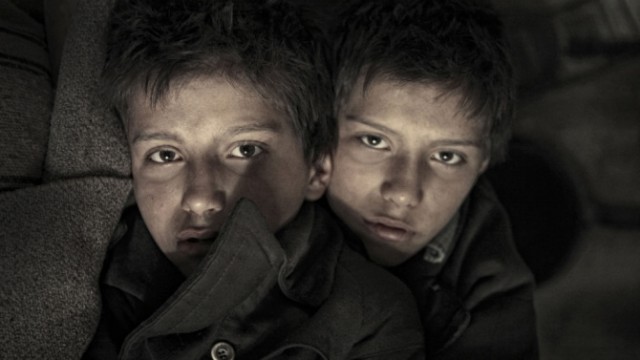Each year, the Academy of Motion Picture Arts and Sciences releases a shortlist of foreign language films that are eligible for an Academy Award. For more on how the process works, click here. In anticipation of that event, we will look at 2013’s nine shortlisted films .Go here for previous installments. This week is Hungary’s official selection, The Notebook.
The Notebook is a chilling indictment of the horrors of war, illustrating how innocent children can be turned into cold-blooded killers through the need to survive.
When the Notebook begins, a pair of 13-year-old twins (played by real-life brothers Laszlo and Andras Gyemant) are living in the city with their mother (Gyongyver Bognar) while their father (Ulrich Matthes) fights in World War II (Sorry, ladies, there’s no Gosling in this version of The Notebook). Their mother decides the city is unsafe, so the boys pack up and move into a ramshackle farmhouse with their Grandmother (Piroska Molnar), a rather bizarre old woman, who many townspeople believe is a witch.
One of the few possessions the boys bring along is a notebook given to them by their father. The boys are supposed to use the notebook to record their lessons and their wartime experiences, but, after being physically, verbally and sometimes sexually abused by virtually everyone they meet, they abandon their schoolbooks for a new kind of curriculum.
The boys train their bodies and minds so they can become hardened survivors instead of weak victims. Their grandmother rations their food so the boys train themselves to go without eating for long periods. Their grandmother and virtually everyone else beats them, so they train their bodies to withstand pain. Soon, they are hardened enough to become a couple of teenage terminators who use stolen grenades to dole out their own particular brand of rough justice.
The Notebook is based on La Grand Cahier, a widely praised novel by Hungarian writer Agota Kristof (the novel is actually written in French). The novel and its two sequels became quite the rage in Europe even earning a rave review from philosopher Slavoj Zizek, which is either an endorsement or indictment depending on your view of Mr. Zizek’s florid ramblings.
I have not read the novel, but it seems that director Janos Szasz plays straight with the source material. The film is beautifully photographed and he gets wonderful performances out of the cast, especially the Gyemant brothers. Their joint performance in this film is both powerful and disturbing and I don’t think it’s too much praise to say they are the equals of Jean-Pierre Leaud in Francois Truffaut’s The 400 Blows.
The film itself is more disturbing, and it does not have anything approaching the humanity of Truffaut’s masterpiece. I think Szasz’s intention is to illustrate how the brutality of war can make even the most innocent among us into hardened cynics, but because The Notebook focuses relentlessly on the point of view of the twins, the film can sometimes alienate the audience because of their sometimes violent behavior. Everyone has their own personal tipping point and the twins lost my sympathy forever with their abuse and torture of helpless animals.
One of the film’s biggest problems is that none of the adult characters are fleshed out. The twin’s parents are ciphers who radically change their behavior for no reason about halfway through the film. Many of the other adult characters are stereotypes right down to the lecherous priest (Peter Andorai) and a gay SS officer (Ulrich Thomsen) in a neck brace who seems to be doing a really, really bad Christoph Waltz impersonation.
Despite my criticisms, I actually commend Szasz for making a challenging film that does not make any compromises with the difficult source material. Sony Pictures Classics is the American distributor of The Notebook and they should also be commended for backing a film about children during World War II that isn’t a maudlin weepie. I have a feeling that after the events of this week surrounding The Interview (ironically also distributed by Sony), we’re not going to see a lot of risk-taking films in the near future.
Grade: B. The Notebook is difficult to watch at times, but it is a thought-provoking drama that fearlessly tackles a controversial subject.
The Notebook is available on demand from Google Play.
I’ll take a Christmas break next week, but I’ll be back in early January to wrap things up.

